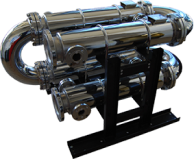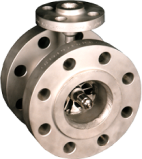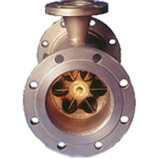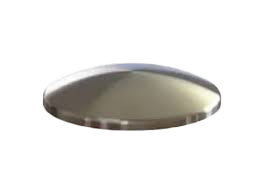Plastic Static Mixers
PVC
PVC, or polyvinyl chloride, is a plastic pipe made from a thermoplastic material. It is a popular piping material due to its cost-effectiveness, durability, and ease of installation. PVC is most commonly used for water and wastewater systems, but it is also used in chemical processing and irrigation systems.
One of the key benefits of PVC is its resistance to corrosion, making it an ideal material for industrial applications that involve chemicals, acids, and other corrosive substances. PVC is also lightweight and easy to install, which can help to reduce the labor and material costs associated with large-scale industrial projects.
In addition to its resistance to corrosion, PVC has other positive attributes that make it useful in industrial settings. For example, it is non-toxic, making it safe for use in water treatment and potable water applications.
Overall, PVC is a versatile and cost-effective piping material that is well-suited for a range of industrial applications such as to make plastic static mixers . Its ability to resist corrosion and its non-toxic nature makes it a popular choice across multiple industries.
CPVC
CPVC, or chlorinated polyvinyl chloride, is a thermoplastic material that is used in industrial applications for hot and cold liquid transportation. It differs from standard PVC in that it has undergone a chlorination process, which increases its ability to withstand higher temperatures and pressures. CPVC can handle temperatures up to 200 degrees Fahrenheit, whereas PVC is typically limited up to 140 degrees Fahrenheit.
Due to its ability to handle higher temperatures, CPVC is commonly used in industrial applications such as chemical processing, water, and waste treatment. CPVC is easy to install and requires minimal maintenance, making it a cost-effective choice for many applications.
One of the positive attributes of CPVC is its resistance to corrosion and chemicals, making it a reliable choice for transporting a wide range of liquids. Additionally, CPVC is lightweight and has a smooth interior, which helps to prevent buildup and clogging within the pipe.
Clear PVC
Clear PVC is a transparent form of PVC (polyvinyl chloride). Unlike standard PVC, it allows for visual inspection of the contents passing through the piping system and it is often used in situations where visual inspection is necessary to ensure quality control. Clear PVC piping has similar properties to regular PVC, including high strength and excellent chemical resistance, but it is not suitable for high-temperature applications.
Clear PVC is used in a variety of industrial and commercial applications, including aquariums, water treatment plants, and chemical processing facilities.
One of the main benefits of clear PVC is its chemical resistance, which makes it an excellent choice for transporting chemicals and corrosive materials. It is also cost-effective and easy to install, making it a popular choice for a wide range of industries.
FRP
Fiber-reinforced plastic (FRP) is a cost-effective solution for industries that require strong and durable piping systems. FRP has great mechanical properties for a low cost, making it a popular choice for various industrial applications. Depending on the type of resin utilized, FRP can also provide useful corrosion resistance making it a suitable material choice for applications where exposure to harsh chemicals or corrosive environments is a concern.
FRP is commonly used in water treatment and water waste applications, as well as in the downstream sector of the oil and gas industry. In water treatment, fiber-reinforced plastic is used to transport water from one location to another, while in the oil and gas industry, its high strength-to-weight ratio and low conductivity makes it ideal for oil and gas facilities.
Fiber-reinforced plastic is lightweight and easy to install, making it a popular choice for industrial piping projects. Additionally, the smooth interior surface of FRP piping minimizes the buildup of deposits and helps to maintain consistent flow rates over time.
Overall, the excellent mechanical properties, corrosion resistance, and low cost of FRP make it a versatile and reliable material choice for a wide range of industrial applications and to make custom FRP static mixers.





